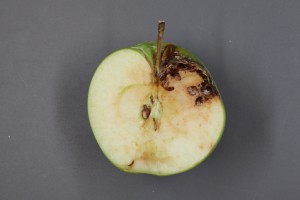Written by Tianna DuPont, WSU Extension. Reviewed by Elizabeth Beers, WSU Entomology. October 23, 2017
A few orchards reported Oriental Fruit Moth (OFM) damage in their organic apple blocks this fall. Mating disruption combined with monitoring will be critical in these blocks next year.
Oriental Fruit Moth is generally controlled by Codling Moth programs in conventional orchards in Washington. However, organic programs may not control OFM. The granulosis virus is highly selective for Codling Moth.
Damage from Oriental Fruit Moth is slightly different than that of Codling Moth. Codling Moth larvae are seed feeders and generally burrow directly toward the seed and seed feeding is often apparent. Oriental Fruit Moth tends to make wandering type tunnels on the surface of the fruit (see Fig. 1). Injured fruit is generally due to third and fourth generation larvae. In order to confirm that damage was from OFM versus Codling Moth the larvae must be examined under the microscope for an anal comb.

If OFM damage was suspected this year, next year monitor for shoot flagging from first generation larvae, deploy pheromone traps for adults and be ready to use mating disruption. First and second generation larvae tend to damage mainly shoots. The larvae enter the shoot near the tip and exit 2 to 6 inches below leaving damage to shoot tips (similar to peach twig borer). Pheromone traps should be placed before bloom.
Oriental fruit moth can be very successfully controlled with mating disruption. Both high density sprayable liquids, medium density hand applied dispensers and low density aerosol emitters are available. Combined CM and OFM dispensers are available. For detailed information on integrating a monitoring and mating disruption program see Managing Oriental Fruit Moths using Mating Disruption by Larry Gut, Michigan State.
Degree Days The Oriental Fruit Moth model has not been validated in Washington however the calculation of degree days is supplied by the WSU Decision Aid System.
Remember Oriental Fruit Moth is generally not present in Washington Orchards. Generally, when found it is only at low levels which do not warrant treatment.
Additional Information
Oriental Fruit Moth – Orchard Pest Management by Jay F. Brunner and Richard E. Rice, WSU Entomology
Manage oriental fruit moths using mating disruption by Larry Gut, Michigan State
Sustainable arthropod management for apples. By Elizabeth H. Beers, Washington State University. In: Sustainable Apple Production. Editor Kate Evans. Burleigh Dodds Science Publishing Limited, 2017.
Contacts
Tree Fruit Extension Specialist, WSU Tree Fruit Research and Extension Center
tianna.dupont@wsu.edu
(509) 663-8181
Department of Entomology
Washington State University
Tree Fruit Research & Extension Center
Wenatchee, WA 98801Phone: 509.663.8181 x234
email: ebeers@wsu.edu
Fruit Matters articles may only be republished with prior author permission © Washington State University. Reprint articles with permission must include: Originally published by Washington State Tree Fruit Extension Fruit Matters at treefruit.wsu.edu and a link to the original article.


